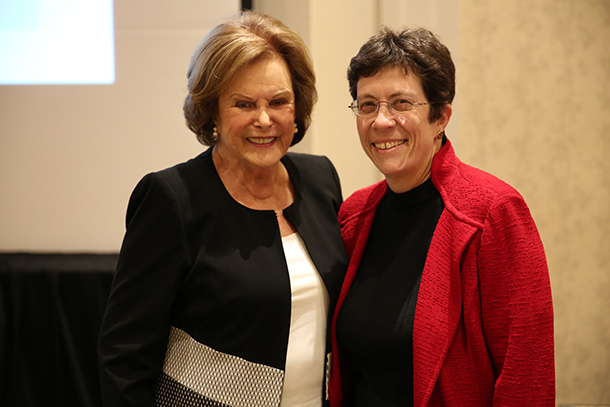On March 1, the second USC Judith D. Tamkin International Symposium on Elder Abuse was held and focused on the mission of creating safe and healthy environments for older adults. Thought leaders from around the globe gathered in Pasadena for two days to share research findings and shape strategies to advance the elder justice field. Experts from diverse fields including scholars, clinicians, activists, lawmakers, caregivers and other stakeholders explored innovative approaches to elder abuse research as well as new ways to integrate community-based participatory research.
This was a unique opportunity for leaders in any field get to come together for two days to share knowledge and collaboratively strategize on moving a field forward and, with 140 attendees, the positive energy was palpable.
“I am looking forward to getting together with people from all around the world who are really interested in this particular area,” said Susan Kurrle, MD, PhD, one of the speakers who traveled from Australia for the symposium. “It is a really terrific gathering of experts and I think the discussions outside the sessions will be just as interesting as in the sessions.”
Keck School of Medicine of USC Interim Dean Laura Mosqueda, MD, welcomed the group. As the director of the USC Center on Elder Mistreatment, housed in the Department of Family Medicine at the Keck School, Mosqueda was the first among many to thank Tamkin for making the symposium possible with her generous support and ongoing commitment to the eradication of elder abuse.
The first day began with an introduction of the Tamkin Scholars, whose early career research offers great promise for the growing field of elder mistreatment. This year featured three up and coming scholars from around the globe: Ariunsanaa Bagaajav, whose work centers on elder abuse detection in primary care in Mongolia; Jolie Crowder, who is conducting a secondary analysis of the National Elder Mistreatment Study with the goal of describing elder abuse within Native American and Alaska Native populations, and Ashfaque Talpur, who is developing a theoretical framework to explain multi-etiological nature of elder abuse around ethnic minority communities living in the United Kingdom.
Following the scholars, keynote speaker Jay Belsky, PhD, an internationally recognized expert in determinants of child abuse, presented information on elder abuse gleaned from the etiology of child abuse.
Over the course of the two-day symposium, panels of experts and innovators addressed diverse topics such as how theory informs research and how to use data sets to answer research questions. A breakout session titled “Moving from Concepts to Prevention” engaged attendees in six discussion groups on pivotal topics such as resilience, social supports, sexual assault, dementia and caregiving.
On the second day, Ferrell Moore, RN, and Laura Brown, LCSW, from the Coordinated Response to Elder Abuse initiative in Memphis, Tennessee, were honored with the Georgia J. Anetzberger Award for their innovative work in creating a multidisciplinary curriculum for elder mistreatment identification and intervention in an emergency department setting.
By the end of the second day, the room was buzzing with new approaches to research, plans to integrate the community in participatory research and freshly identified ways to fund and expand opportunities to ensure elder justice, making the vision of Judith D. Tamkin a reality.
“We always need to keep in mind that the work we are doing isn’t just interesting, but it is life changing for people,” Mosqueda said in her closing remarks.
The next USC Judith D. Tamkin International Symposium on Elder Abuse will take place in 2020.
For more information on the Tamkin Symposium and the USC Center on Elder Mistreatment and their transformative work in elder justice, go to http://eldermistreatment.usc.edu/.
— Claire Norman


